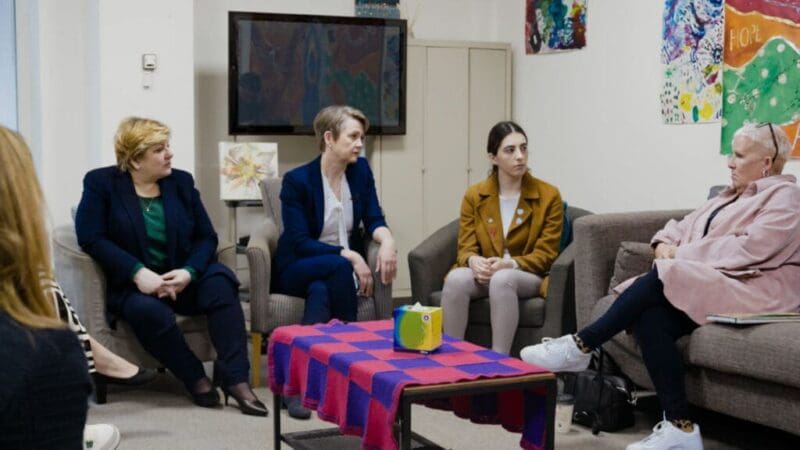During their tour of Advance’s West London Women’s Centre, the Shadow Cabinet members outlined the key recommendations of The Charging Commission, set up with the core purpose of delivering justice for victims, with a particular focus on victims of domestic abuse, rape and sexual assault.
Yvette and Emily met frontline staff and talked to women who have used Advance services, who shared their experiences of domestic abuse and being failed by the criminal justice system, including police attitudes to reporting of abuse.
After visiting Advance’s Hammersmith Women’s Centre, Shadow Home Secretary Yvette Cooper said:
“Labour has set an ambitious mission to halve violence against women within ten years and to do that we need to work with organisations like Advance and to learn from their expertise and the experiences of survivors so we can help to prevent domestic abuse and reform the criminal justice system so it better protects victims.”
Liz Mack, CEO of Advance, said:
“We welcomed the Shadow Home Secretary and Shadow Attorney General’s openness and interest in listening to the women’s stories, the role of our women’s centres, and need for specialist support and training throughout the criminal justice system.”
Labour’s Charging Commission, established by Yvette and Emily, explores how the police and the Crown Prosecution Service can work more effectively together to deliver justice for victims, particularly domestic abuse survivors.
Gigi, one of the women supported by Advance, said:
Tracey, another woman with lived experience, said:
The Commission’s recommendation is to give victims in domestic abuse, rape and sexual assault cases the right to have specialist support advisors with them throughout the criminal justice process.
Criminal Justice Independent Domestic Abuse Advocates (CJ IDVAs) are a vital part of Advance’s Whole Justice Approach which aims to improve prosecutions and convictions of abuse by working jointly with the police, CPS, courts and prison services, supporting both professionals and survivors. And the Approach works – we’ve seen a 51% increase in the proportion of arrests leading to charges and a 34% increase in rates of conviction of DA cases.
Advance’s Her Story, Her Justice report calls for a duty to collaborate between the police and the Crown Prosecution Service and joint performance monitoring is also echoed by the Commission.
Media enquiries
For more information, please contact Tracie Couper, Press Officer at Advance, at tracie.c@advancecharity.org.uk or on 0743 2700 287.
- Advance’s specialist advocates work in partnership with 11 local and national women’s service providers, alongside statutory services to provide services within women’s communities across the 6 regions of Hampshire, Kent, Thames Valley, Essex, Hertfordshire, and Bedfordshire.
- Through our woman-centred approach, we aim to prevent the cycle of re-offending, tackling issues such as lack of consistent housing and homelessness, domestic abuse and sexual violence, mental health, emotional well-being, parenting and family relationships, education training and employment, finance, benefits, and debt.
- 53% of women in prison report having experienced emotional, physical, or sexual abuse as a child compared to 22% of men.
- 72% of women who entered prison in 2020 have committed a non-violent offence.
- 57% of women in prison and under community supervision report being victims of domestic abuse. The true figure is likely higher, as many women fear disclosing abuse.
- 50% of women, compared to 22% of men, have reported that they offended to support someone else’s drug use.
- Read Advance’s latest report, ‘Her Story, Her Justice’.
About Advance
- Advance’s vision is a world in which women and children lead safe, equal, violence-free lives so that they can flourish and actively contribute to society. The charity works with women who experience domestic abuse to be safe and take control of their lives, and women who have committed crime or are at risk of offending to break the cycle.
- As well as providing direct support, Advance works with statutory services, government agencies and other women’s charities to ensure a holistic approach to the issues these women face.
- Women must be referred to Advance, via statutory services or the charity’s self-referral scheme. For more information about who Advance is able to support, please visit Get help
- For facts and statistics about domestic abuse and women in the criminal justice system, as well as Advance’s work, please visit Our impact



